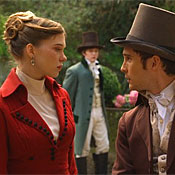- REVIEW
- READER REVIEWS
Mysteries of Lisbon (Misterios de Lisboa)
|
(No longer in theaters)
|
|
Genre
Drama
Distributor
Music Box Films
Release Date
Aug 5, 2011
Release Notes
NY/LA
Official Website
Review
In Mysteries of Lisbon, the prolific Chilean-born director and egghead Raúl Ruiz has achieved something remarkable, at once avant-garde and middlebrow: the apotheosis of the soap opera. Based on a novel (unavailable in English) by the (also prolific) nineteenth-century Portuguese author Camilo Castelo Branco, the film unfolds on what looks like the most sumptuous puppet stage ever created, the occasional cuts to an actual puppet stage suggesting this might be the dream of a young puppeteer named Pedro (João Arrais), an apparent orphan in a boarding school run by the supremely empathetic Father Dinis (Adriano Luz). The characters, however, are anything but puppets: They have depth, wayward passions, and a Catholic penchant for deathbed repentance. They are tragically madcap.
The film, which is 257 minutes long (cut down from six episodes originally made for TV), tells the story of Pedro’s origins—not just the tragic tales of his parents but of those who saved his life and continue to determine his fate. Point-of-view is passed like a baton. There are multiple narrators, flashbacks within flashbacks, crisscrossing story lines, incredible coincidences, and characters who shed one identity and pick up another. The camera mirrors the narrative flow. Shot on digital video by André Szankowski, Mysteries of Lisbon is limpid, legato, full of fluid tracking shots and lengthy takes, the images painterly, the space layered. It’s not a probing camera, but it’s always in the right place to capture what’s important, the furtive glance or frenzied glower.
In the large cast of Portuguese and French actors, Luz (with multiple personas) is the most intensely likable, Ricardo Pereira as a seducer the most devilishly intriguing, Clotilde Hesme as a vengeful orphan the most beguilingly beautiful. The film is like a Barry Lyndon that breathes, the proportion of period detail to people just so. You can study it, like a painting, and then realize, with a gasp, that it has got hold of you like a fever.
